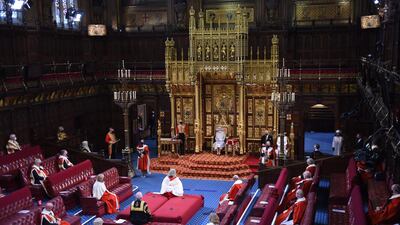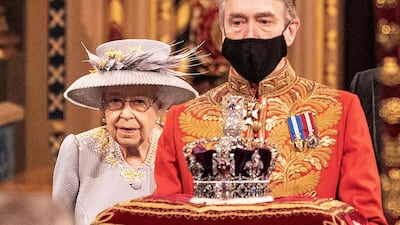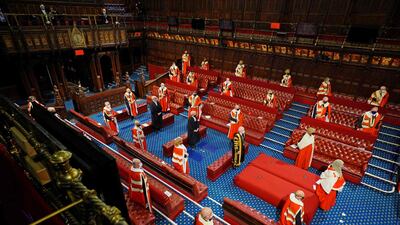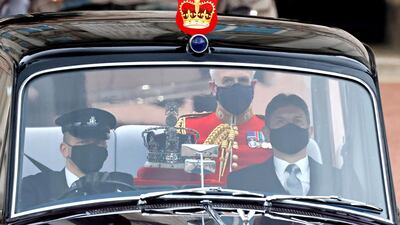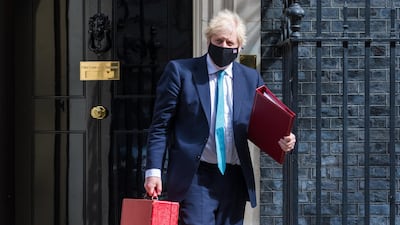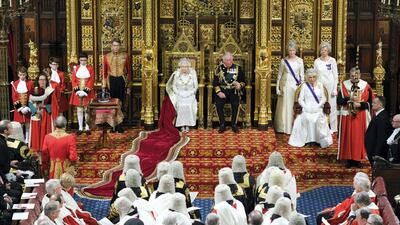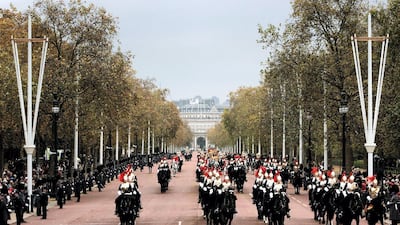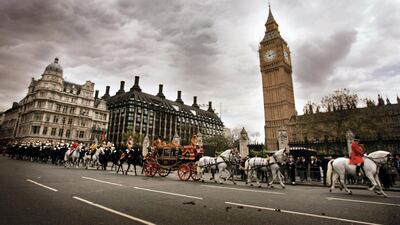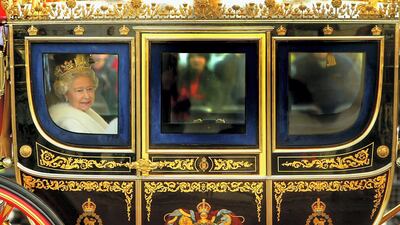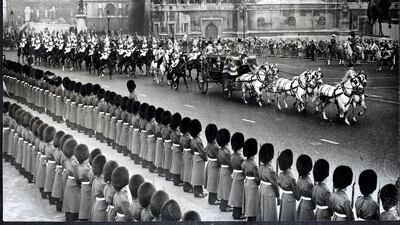The UK will deepen trade ties with Arab Gulf nations, Britain’s Queen Elizabeth II said on Tuesday as she set out policy goals the UK government hopes to achieve over the coming year.
In a ceremony stripped back owing to Covid-19, the queen read out the bills Prime Minister Boris Johnson hopes to pass this year.
These cover healthcare reform, a clampdown on illegal immigration and environmental policies in the lead-up to November’s Cop26 climate change summit in Scotland.
In the 18 months since Mr Johnson's Conservatives were re-elected with a big parliamentary majority, his agenda has largely been eclipsed by Covid-19, and government spending is at its highest level since the Second World War.
With Britain's vaccination programme now far ahead of many other countries and cases of the virus at low levels, Mr Johnson hopes to revive his “levelling up” agenda and complete the UK’s tilt to non-traditional markets in the post-Brexit era.
"My government's priority is to deliver a national recovery from the pandemic that makes the UK stronger, healthier and more prosperous than before," the queen, 95, told parliament in the speech written by the government.
"To achieve this, my government will level up opportunities across all parts of the UK, supporting jobs, businesses and economic growth and addressing the impact of the pandemic on public services."
‘Deeper ties’ with Arab Gulf
The queen said UK ministers would “deepen trade ties in the Gulf, Africa and the Indo-Pacific”.
The pledge confirms remarks made by a former Downing Street chief of staff last month that the UK started formal steps for a free-trade agreement with Arab Gulf countries.
According to a briefing document that accompanied the speech, the UK wants to foster “thriving relationships in the Middle East based on trade, green innovation and science and trade”.
The document also said the government would use “a range of trade policy tools to strengthen our bilateral trade relations with key economic and strategic partners across the Indo-Pacific, South Asia, Middle East, Africa, the Americas and Europe”.
“This includes exploring the options for new free trade agreements with our trading partners,” it states.
The prospect of a trade deal with the UAE was looked on favourably by the Emirates' ambassador in London.
"Following the queen's speech, the UAE welcomes the UK's commitment to deepen trade ties with the Gulf region," His Excellency Mansoor Abulhoul said. "Our countries already have strong business connections, with the UAE continuing to be the UK’s top Arab trading partner and more than 5,000 British businesses operating in the Emirates. We are proud that so many Britons already choose to export to the UAE and have a presence in the Emirates as a gateway to the wider Gulf region."
He said the countries already collaborated across several sectors from energy to financial services, highlighted by an £800 million investment from the UAE into UK life sciences. "We hope to build on this foundation to the benefit of both countries as we all look to deliver economic prosperity in the aftermath of the Covid-19 pandemic," the ambassador said.
Lord Edward Lister, co-chairman of the UAE-UK Business Council, previously said unprecedented developments in forging trade links were coming.
"There is a lot of work under way at the moment – consultation is shortly about to start on it – on new trade arrangements into the Gulf, which will be a free-trade agreement," he said. "That's a major piece of government work."
Eight more freeports will also be set up in England, and the government will work to establish more in Scotland, Wales and Northern Ireland. Goods that arrive at freeports from abroad are exempt from taxes.
NHS to receive funding boost
Meanwhile, the queen said the government would bring forward long-awaited plans for the funding of care for the elderly.
She said the government would provide additional funding to support the NHS, including new legislation that would allow medical workers to "innovate and embrace technology".
Her speech also included details of a “catch-up and recovery plan” to address the “unprecedented challenge” facing the health service after the pandemic.
About 4.7 million people in England are waiting for care and more than 380,000 have been waiting more than a year for treatment.
As well as a commitment to clearing the backlog, the government has pledged to “account for the returning demand of those people who have not come forward for care during the pandemic”.
The monarch said ministers wanted patients to receive more tailored and preventative care closer to home.
Clampdown on illegal immigration
Addressing new laws to curb illegal immigration, the queen said the government would “strengthen the borders” and develop a system that “deters criminals who facilitate dangerous and illegal journeys”.
She said the UK government was committed to providing foreign aid “where it has the greatest impact”.
Ministers will also take forward a global effort to get 40 million girls across the world into school, the queen said.
Tightening immigration rules and securing borders were vote-winning promises of Mr Johnson's campaign for leaving the EU, as well as in securing his 2019 election win.
But by differentiating between asylum seekers who enter by legal channels and those who enter Britain from "safe" destinations like France, the government provoked anger among rights groups.
The UNHCR said the UK's proposals could breach international law and be "expensive and hard to implement".
But Mr Johnson's spokesman said the plans comply with all laws.
Climate change
On climate change, the government repeated its commitment to achieve net-zero greenhouse gas emissions by 2050, a pledge it hopes will spur other nations to cut their emission targets before the UN summit in November.
The queen said the government would invest in green industries “to create jobs while protecting the environment”.
The government will also embark on the fastest increase in public funding for research and development, and establish an advanced research agency.
Foreign interference strategy
Alongside the speech, the UK set out plans to crack down on hostile activity by foreign states, introducing a proposed law to give security services and law enforcement new powers to tackle growing threats.
The bill will haul legislation into the modern age, updating archaic official secrets acts, some dating back more than 100 years so that they are relevant to the threats posed in the age of cyber warfare, the government said.
British spy chiefs said China and Russia sought to steal commercially sensitive data and intellectual property and interfere in politics, while Russian agents are also accused of carrying out an attack on former Russian spy Sergei Skripal on British soil in 2018.
The country's treason law could also be revamped, as the country looks to suppress state-backed espionage, according to the briefing document.
"We are also considering whether there is a case to be made for criminalising other harmful activity conducted by and on behalf of states, including the consideration of updating treason laws," the document said.
A Foreign Influence Registration Scheme would also be created to help combat espionage, foreign interference and better protect scientific research.
Labour criticises 'piecemeal approach'
Normally an annual event replete with five centuries of tradition and pageantry, which last occurred in late 2019 amid political acrimony over Brexit, the monarch's State Opening of Parliament was scaled back this year due to the pandemic.
This meant far fewer attendees and the queen travelled to Westminster by car instead of in a horse-drawn carriage.
Only a select few from parliament's two chambers attended and tested negative for Covid-19.
The queen was accompanied by her son and heir, Prince Charles, 72, as she returned to public duties three weeks after the Duke of Edinburgh was buried.
Mr Johnson said countering the coronavirus remained the "number one priority" but insisted the recovery provided a "historic opportunity to change things for the better".
"As the UK gets back on its feet, we will turbo-charge our economic recovery in every part of our country, increasing and spreading opportunity," he added.
However, much of the speech consisted of policies already announced, prompting the Labour Party to challenge the government to turn its "rhetoric into reality".
"The Conservatives have so far tried to hide their lack of a long-term plan by making people and places scrap over funding pots," Labour leader Keir Starmer said.
"This piecemeal approach won't deliver the fundamental change our country needs. Instead, we must today see meat on the bones of a proper, ambitious plan to deliver the change people across the country deserve."

